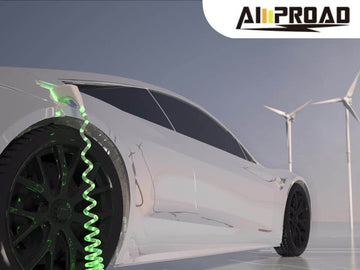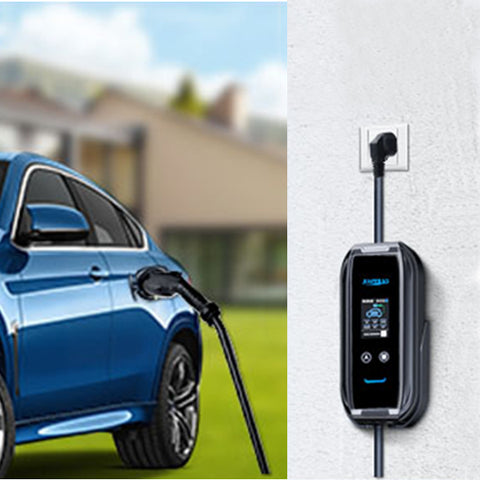
As the number of electric vehicle owners grows, so does the demand for convenient and effective home charging options. A frequent question that arises is whether a Level 2 EV charger can be plugged into a dryer outlet. Although a standard dryer plug—usually a NEMA 14-30 or 10-30—provides the same 240V voltage needed for a Level 2 charger, repurposing it for EV charging poses notable challenges and potential safety hazards. Let’s take a closer look at the details of this issue.
Can a Level 2 Electric Vehicle Charger Connect to a Dryer Outlet? ![]()

Plugging a Level 2 EV charger directly into a dryer outlet might seem like a quick solution, but there's a catch. Let's explore the compatibility issues that could turn this quick fix into a safety headache.
- Different Plug Types: Level 2 EV chargers typically use a NEMA 14-50 plug, while dryer outlets usually have a NEMA 14-30 or 10-30 plug. These plugs have different configurations of prongs, making them incompatible.
- Amperage Differences: NEMA 14-50 outlets are designed for 50 amps, which is the standard for Level 2 EV charging. Dryer outlets, on the other hand, are usually rated for 30 amps (NEMA 14-30) or sometimes even less (NEMA 10-30). This difference in amperage means a dryer outlet might not be able to provide enough power for the EV charger.
- Wiring Differences: Even if you were to somehow force the plugs to fit, the wiring in your home might not support the higher amperage required by the EV charger. This could lead to overloaded circuits, tripped breakers, or even a fire hazard.
Important Safety Note: It's crucial to never attempt to modify the plugs or force them to fit. This is extremely dangerous and could lead to serious consequences.
What Are the Safety Concerns?
Beyond compatibility issues, safety is paramount. Using a dryer outlet for an EV charger can overload circuits, cause overheating, and even pose a risk of electrical shock.
Overloading the Circuit
Dryer outlets are typically rated for 30 amps, while Level 2 EV chargers often range from 32 amps to 48 amps. Connecting a high-amperage charger to a circuit not designed for it can lead to overheating and potential fire hazards. This overloading can occur because the wiring in your home may not be rated to handle the continuous load required by an EV charger, which can run for several hours compared to the intermittent use of a dryer.
Wear and Tear
Dryer outlets are designed for occasional, short-term use during drying cycles. The frequent plugging and unplugging required for EV charging can significantly increase wear and tear on the outlet and wiring, increasing the risk of electrical issues. Over time, this can degrade the outlet's components, leading to poor connections, increased resistance, and the potential for overheating.
Improper Grounding
Some older dryer outlets might lack proper grounding, a crucial safety feature for EV charging. Using an ungrounded outlet can pose a serious risk of electrical shock. Grounding ensures that in the event of a fault, the excess electricity has a safe path to the ground, preventing it from passing through the user or causing a fire.
Are There Alternatives and Considerations?
Since that plug in the dryer outlet may be dangerous, such as overload circuits, cause overheating, and even pose a risk of electrical shock. Are there any feasible alternatives and considerations?
Dedicated EV Charger Installation
The safest and most efficient option is to have a qualified electrician install a dedicated Level 2 EV charger with the appropriate amperage rating and J1772 connector. This ensures your home's electrical system can handle the increased load safely. AMPROAD offers various options, such as a Max 48-amp EV charger for home and commercial use, which provide reliable and efficient charging without compromising safety.
Dryer Buddy Box
Some companies offer "Dryer Buddy" solutions, which are essentially splitter boxes that allow you to safely share the dryer outlet between your dryer and a lower-amperage EV charger (typically 16 amps or less). However, this still requires professional installation and might not be suitable for all situations. While this solution can be convenient, it doesn't provide the same level of reliability and safety as a dedicated charger.
How Can You Ensure Safe EV Charging at Home?

Ditch the dryer outlet! Safe home EV charging starts with a dedicated Level 2 charger installed by a qualified electrician. This ensures your electrical system can handle the power demands without compromising safety. It's a worthwhile investment for peace of mind and efficient charging.
Understanding Electrical Capacity
Before considering any installation, it's essential to understand your home's electrical capacity. Have a licensed electrician assess your electrical panel to determine if it can support a Level 2 EV charger. This assessment will include evaluating the existing circuits, available amperage, and overall load capacity. Upgrading your panel may be necessary to accommodate the additional load, ensuring safe and efficient charging.
Installing a Dedicated Circuit
A dedicated circuit for your EV charger eliminates the risk of overloading existing circuits. This circuit should be appropriately rated for the charger's amperage and include all necessary safety features, such as proper grounding and GFCI protection. A dedicated circuit not only enhances safety but also ensures optimal performance, reducing charging times and improving the overall efficiency of your EV charging setup.
Choosing the Right Charger
Selecting a high-quality EV charger is crucial. AMPROAD offers a range of products, including portable EV chargers and plug-in EV wall chargers, designed for both home and commercial use. These chargers are built to meet stringent safety standards, providing peace of mind while delivering efficient charging.
What Are the Benefits of Professional Installation?
While DIY might seem tempting, professional installation offers peace of mind. A qualified electrician ensures your electrical system is properly assessed and equipped to handle the increased load of a Level 2 EVSE charger. Here below are the benefits of professional installation:
Ensuring Compliance with Codes
Professional electricians ensure that your installation complies with all local electrical codes and regulations. This compliance is crucial for safety and can prevent potential legal issues. Electricians are trained to follow best practices, ensuring that your EV charger is installed correctly and operates safely.
Optimizing Charger Placement
Professionals can help optimize the placement of your EV charger, taking into account the layout of your home, the location of your electrical panel, and the positioning of your vehicle. Proper placement minimizes the distance between the charger and your vehicle, reducing installation costs and improving convenience.
Future-Proofing Your Setup
A professional installer can also help future-proof your setup, considering your potential needs for higher amperage chargers or additional EVs. They can advise on installing a larger electrical panel or running conduit for future upgrades, ensuring that your home is ready for any changes in your EV charging requirements.
How Can You Prepare for a Professional Installation?
Before your electrician arrives, gather info on your electrical panel's capacity and any permits required in your area. This helps them assess your needs and ensure a smooth installation process.
Assessing Your Needs
Before scheduling an installation, assess your charging needs. Consider factors such as your daily driving distance, the size of your EV's battery, and your typical charging schedule. This assessment will help you determine the appropriate amperage for your charger and ensure that your setup meets your requirements.
Budgeting for Installation
Budgeting for the installation includes not only the cost of the charger but also potential upgrades to your electrical system. Obtain quotes from several electricians and compare their services and prices. Investing in a high-quality installation can save you money in the long run by preventing potential issues and ensuring efficient charging.
Scheduling the Installation
Once you have selected a charger and assessed your needs, schedule the installation at a convenient time. Ensure that you are available to discuss any concerns or preferences with the electrician, and provide them with access to your electrical panel and the installation site.
What Are the Long-Term Benefits of a Proper Installation?

A properly installed Level 2 home EV charger offers long-term benefits. Enjoy safe, efficient charging with minimal risk of overloading your electrical system. Plus, a professional installation ensures your charger meets all safety codes and regulations, potentially increasing your home's resale value.
Enhanced Safety
A proper installation enhances safety by ensuring that your electrical system can handle the load of the EV charger. This reduces the risk of electrical fires, shocks, and other hazards, providing peace of mind for you and your family.
Improved Efficiency
An efficiently installed charger reduces charging times and ensures that your EV is always ready when you need it. This efficiency can save you time and money, especially if you rely on your EV for daily commuting or long-distance travel.
Increased Property Value
Installing a dedicated EV charger can increase your property's value, making it more attractive to potential buyers. As EV ownership continues to rise, having a reliable and efficient charging solution at home can be a significant selling point.
What Are the Key Takeaways?
While it might be technically possible to use a dryer outlet for a Level 2 EV charger with an adapter, it is generally not recommended due to safety and compatibility concerns. The potential risks of overloading circuits, causing wear and tear, and improper grounding outweigh any convenience it might offer. The best approach is to have a dedicated Level 2 EV charging station installed by a qualified electrician, ensuring safe, efficient, and reliable home charging.
AMPROAD offers a range of high-quality EV chargers suitable for home and commercial use, designed to meet stringent safety standards and provide optimal performance. By investing in a professional installation and choosing the right equipment, you can enjoy the benefits of efficient and convenient EV charging without compromising safety.
All in all, while the idea of using a dryer outlet for EV charging may seem appealing due to its convenience, the potential drawbacks make it a less viable option. Opting for a dedicated installation not only ensures safety and compliance with electrical codes but also provides a reliable and efficient solution for your EV charging needs.


